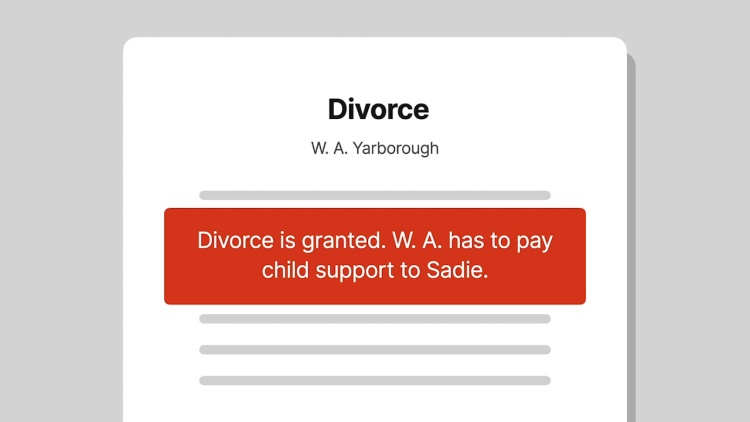Yarborough v. Yarborough
United States Supreme Court
290 U.S. 202 (1933)

- Written by Denise McGimsey, JD
Facts
W.A. Yarborough (father) (defendant) and Mrs. Yarborough (mother) lived with their daughter, Sadie (plaintiff), in Georgia. In 1927, the father filed for divorce in a Georgia court. The mother cross-complained for divorce, custody of Sadie, and support. The court granted a divorce, awarded custody of Sadie to the mother, and ordered the father to pay $1,750 to Sadie’s grandfather, in his capacity as Sadie’s trustee, to provide for her maintenance, education, and other necessities. The support decree, which was considered unalterable under Georgia law, was intended to fulfill the father’s obligations of support for Sadie. She was not a party to the proceedings. After the divorce, Sadie moved to South Carolina where her grandfather lived. In 1930, when she was 16, Sadie sued her father in a South Carolina court for additional funds for her education and maintenance. She alleged that without such funds, she would become a burden on others. The father was still living in Georgia but owned property in South Carolina. His property was attached and he was eventually served in South Carolina. The South Carolina court ordered him to pay $50 per month towards Sadie’s education and maintenance. The father sought review by the United States Supreme Court.
Rule of Law
Issue
Holding and Reasoning (Brandeis, J.)
Dissent (Stone, J.)
What to do next…
Here's why 905,000 law students have relied on our case briefs:
- Written by law professors and practitioners, not other law students. 47,100 briefs, keyed to 995 casebooks. Top-notch customer support.
- The right amount of information, includes the facts, issues, rule of law, holding and reasoning, and any concurrences and dissents.
- Access in your classes, works on your mobile and tablet. Massive library of related video lessons and high quality multiple-choice questions.
- Easy to use, uniform format for every case brief. Written in plain English, not in legalese. Our briefs summarize and simplify; they don’t just repeat the court’s language.





